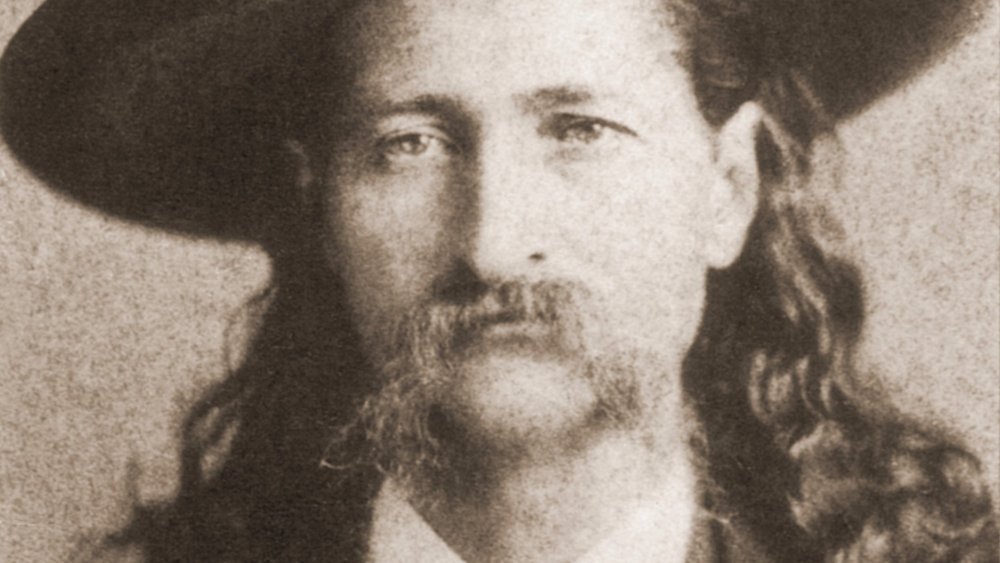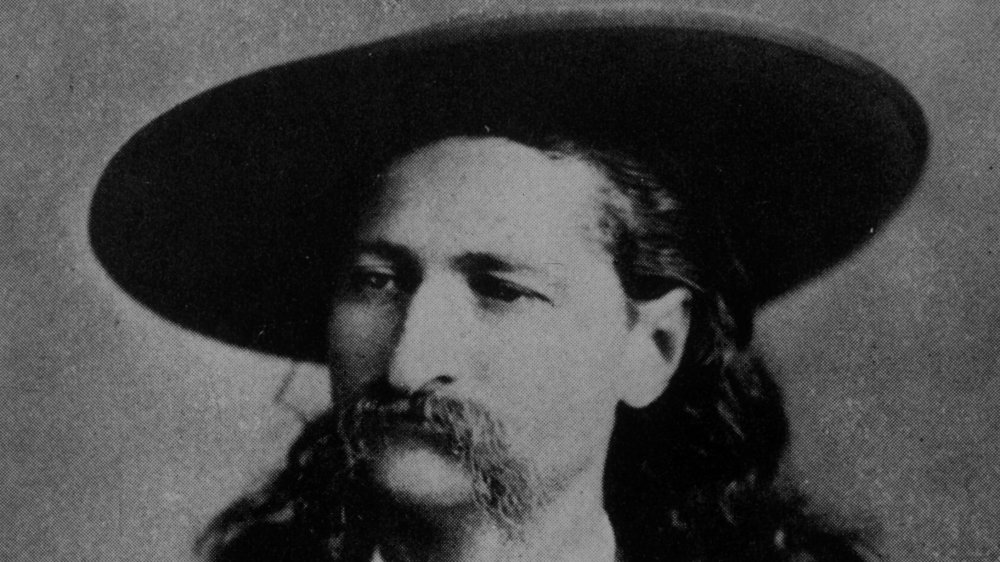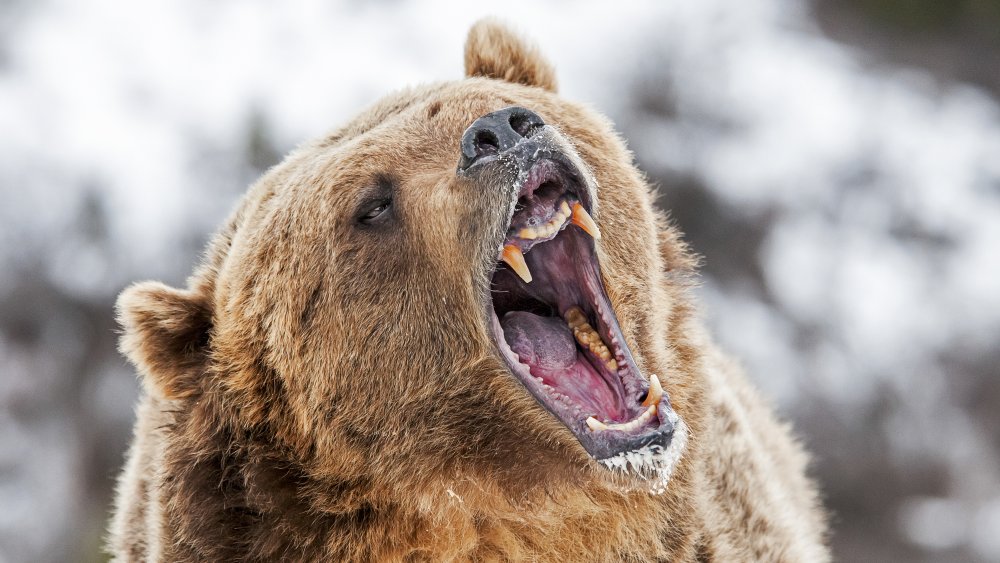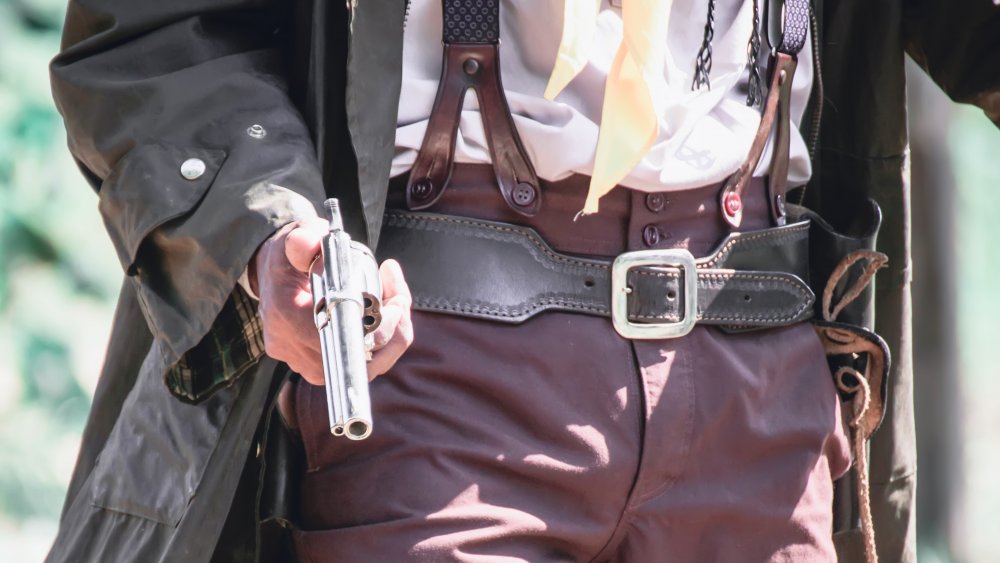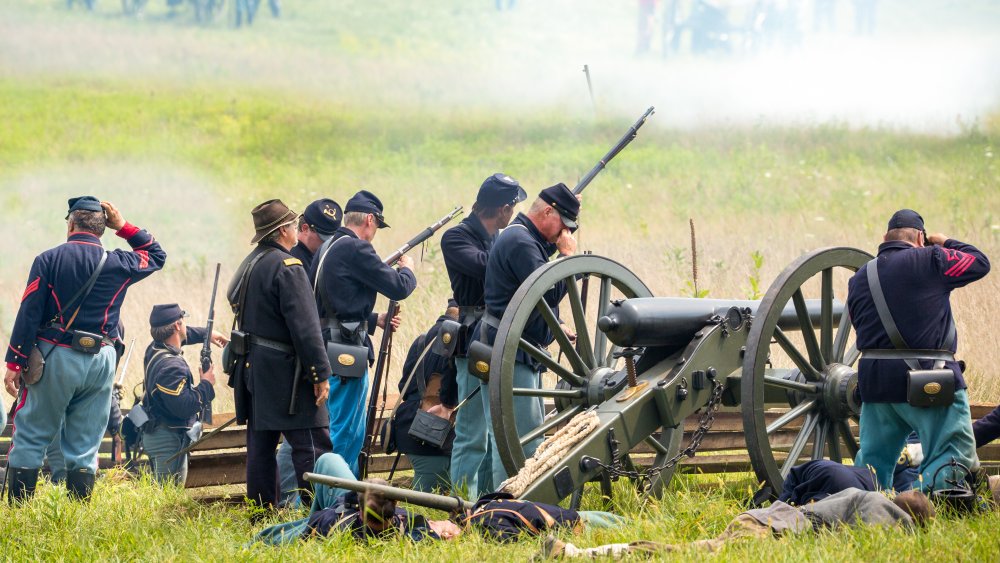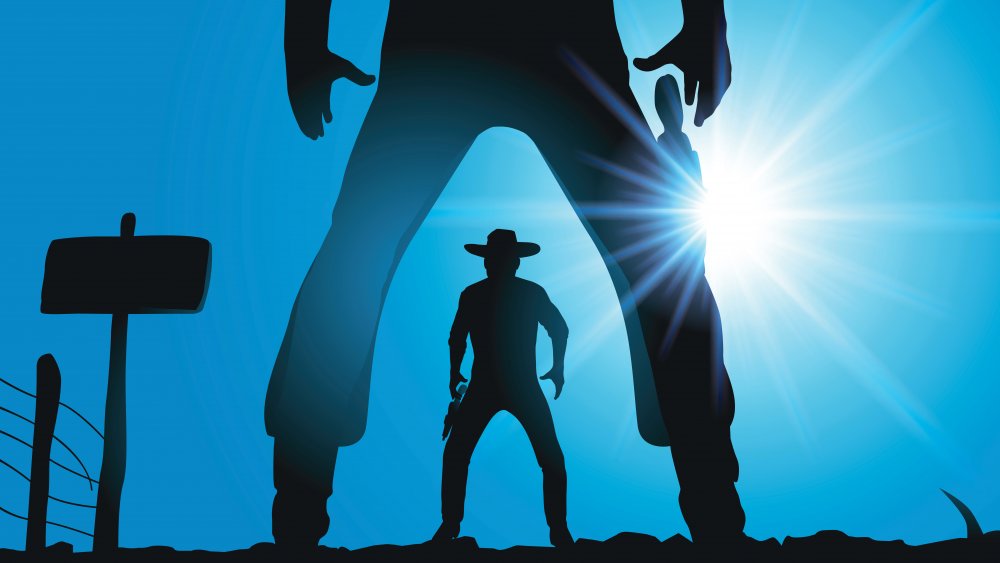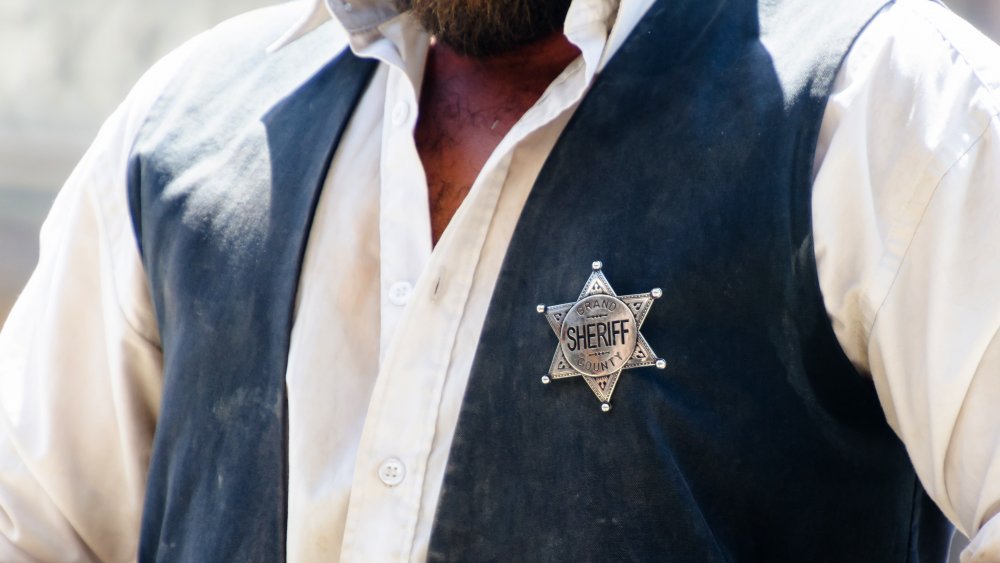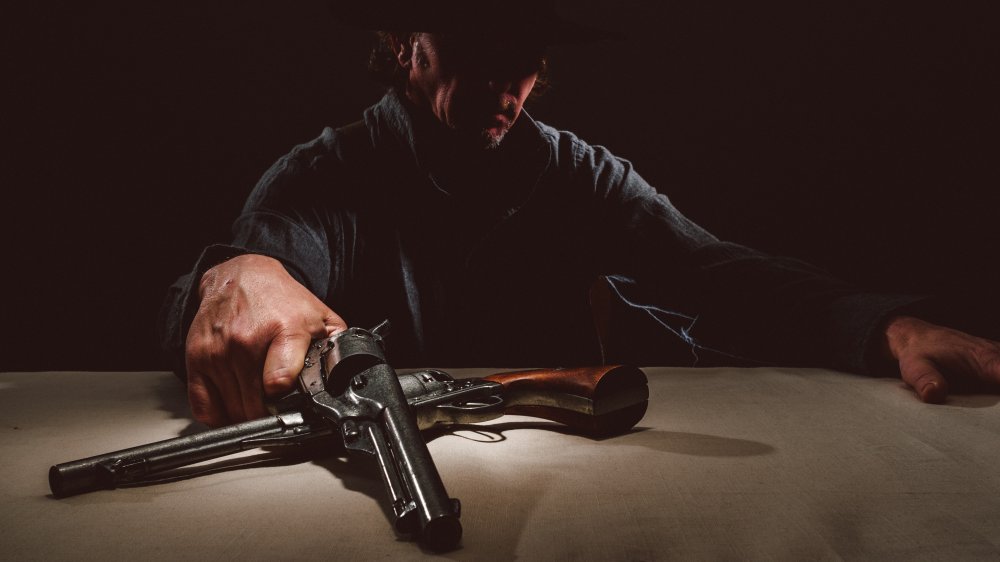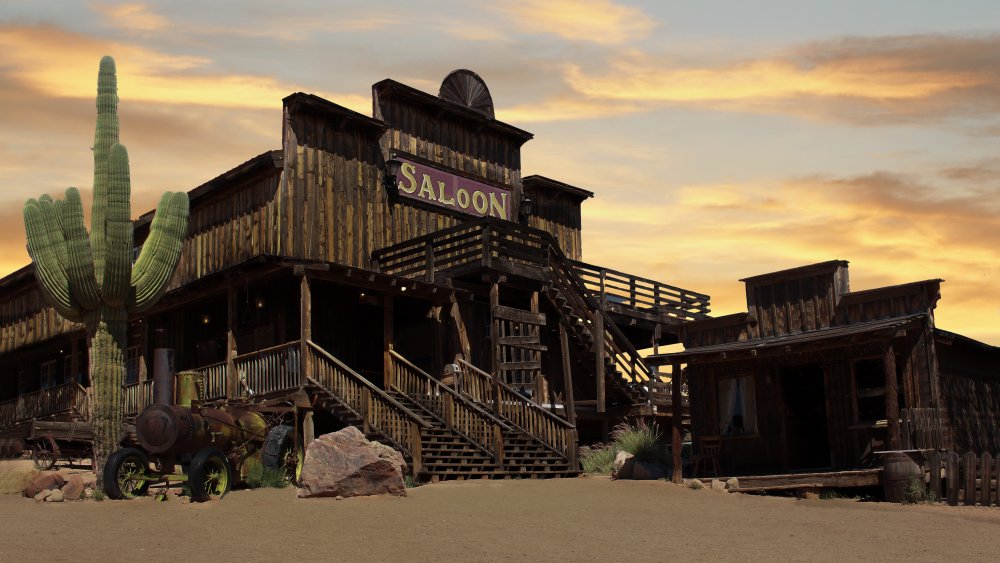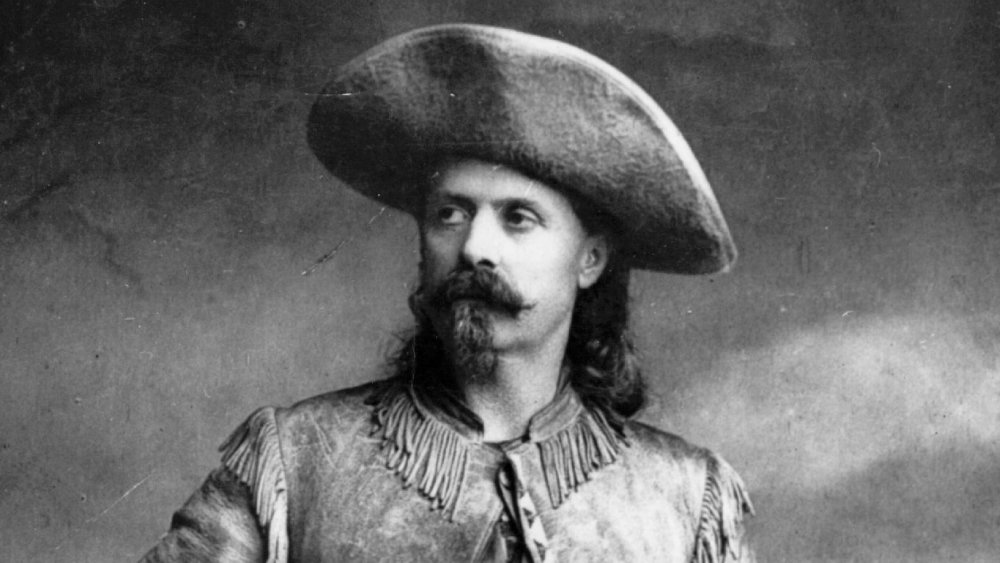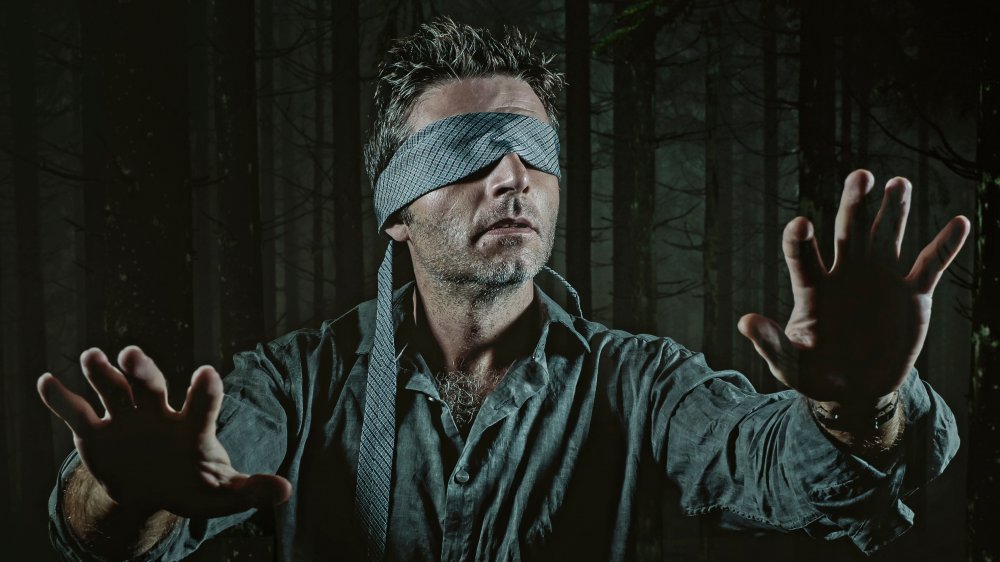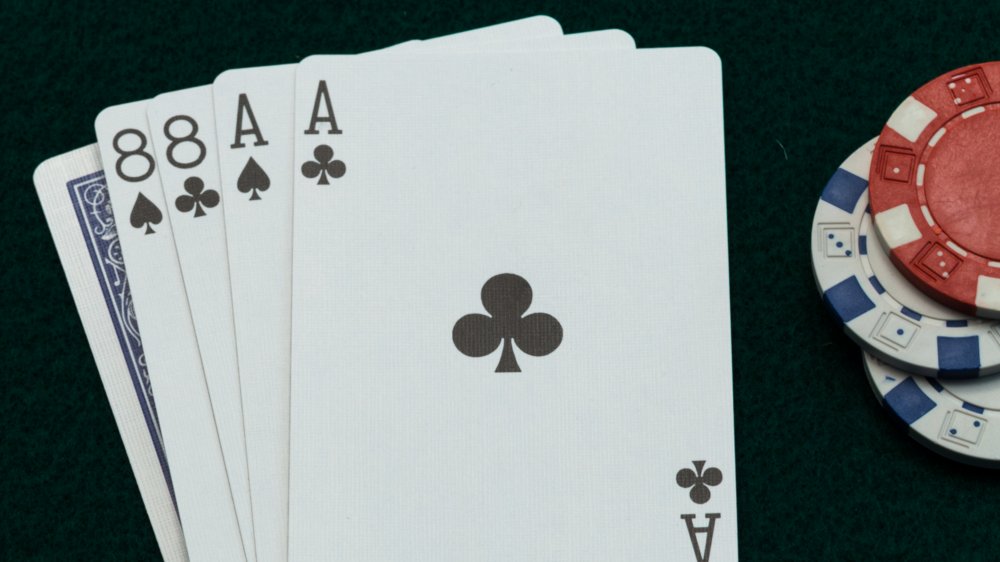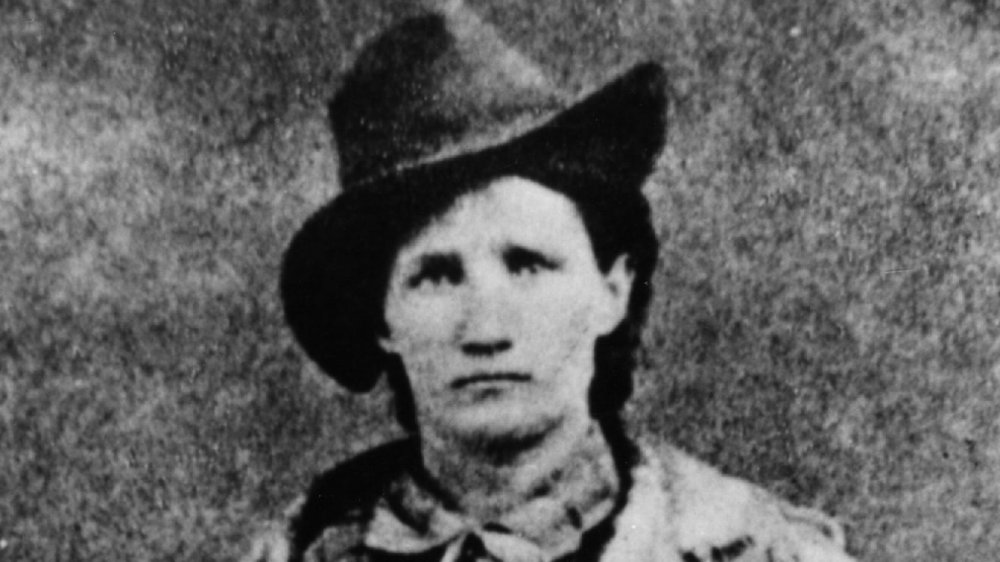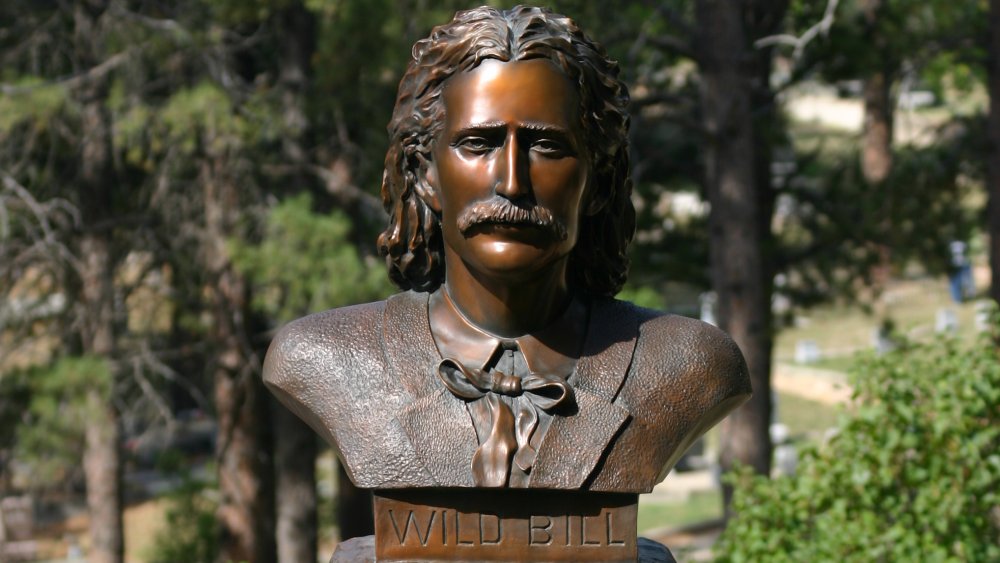The Incredible Life Of Wild Bill Hickok
Wild Bill Hickok is not just a legendary Old West character — for many, he's the legendary Old West character. The gloriously mustached frontier adventurer managed to fill his 39 years on this Earth with virtually every Wild West activity you can think of and more, and is one of the rare people who acquired the status of folk hero during their lifetime. This was helped by the numerous books, movies, and TV shows that have carried his legacy to younger and less outdoorsy generations, not to mention the fact that Hickok himself was never exactly shy about tooting his own horn, when the opportunity arose.
You might have heard about one or two of Wild Bill's exciting escapades, but you probably don't know much about the most significant events of his amazing personal history. Where did he come from? How did he acquire his reputation? What sorts of adventures did he have? And how did such a legendary figure die so young? Let's take a look at the incredible life of Wild Bill Hickok.
Wild Bill Hickok's early years
Every legend has to start somewhere, and according to Encyclopedia Britannica, James Butler Hickok started his road to Wild Bill-ness on May 27, 1839 in Homer, Illinois. He didn't even have to leave home to have his first brush with history, as the Hickok homestead was a safe house on the Underground Railroad (the secret system of routes for African-American people to escape the Southern slave trade). However, folk heroes gotta folk hero, so by the time he was 17, Hickok left the family farm and started a life of adventure. After a stint as a canal boat pilot in Utica, he headed out west and joined the Free State Army of Jayhawkers to fight for antislavery in the Bleeding Kansas conflict. By this time, he was already a skilled gun user, so he ended up serving as a bodyguard for his faction's general, James H. Lanes.
All along, young Hickok built a reputation as a brave and fair man. This earned him the position as a constable in Monticello, Kansas around 1858, leaving him in a prime position to start really making his name. For those keeping count, he was only 18- or 19-years-old at the time.
Wild Bill Hickok and the battle with the bear
In 1858, Wild Bill Hickok faced one of the toughest opponents of his life: A furious bear. As Encyclopedia Britannica tells us, Hickok was working with the creators of the Pony Express as a teamster (he was way too large to be a rider), when his wagon encountered a furry, ursine roadblock. Hickok decided to shoot the bear, which immediately proved to be a bad move. The animal returned the favor by attacking Hickok and nearly crushing him to death. However, Hickok managed to kill the animal with his knife. Truly, a tale of heroism and survival for the ages, unless you're a bear.
To be fair, though, Biography notes that the bear fight has become such an iconic and often-embellished part of Hickok's legend that no one's quite sure how it actually went down, or whether it really happened at all. Though Hickok was certainly badly injured by something at this stage of his life, there are zero contemporary accounts of bear-themed battles. This has led some people, such as biographer Joseph Rosa, to suggest that the bear tale was actually made up by writer James W. Buel, who may have simply whitewashed a story about a similar tale about a Cheyenne Indian chief's fight with a bear.
The gunfight that made Wild Bill Hickok famous
As Biography and History tell us, Wild Bill Hickok truly made his name in July 1861. The 24-year-old was working as a stable hand at a stage depot at Nebraska's Rock Creek Station, and reportedly, had beef with a man called William McCanles, who Encyclopedia Britannica reports had taken a dislike of Hickok and wasted no time insulting the young man when opportunity arose. Hickok, on the other hand, returned the favor by starting an affair with McCanles' mistress.
What exactly started the gunfight between McCanles' men and Hickok is unclear, as is the exact course of events. Some sources say the former had learned about the latter's mistress-related shenanigans. Others state that McCanles came to the station with two stable hands and his 12-year-old son in order to demand money for a property he had sold to Pony Express. Regardless of how things started, they turned into an exchange of bullets, and the fact that the incident is now known as the McCanles Massacre tells how badly things went for the guy and his two henchmen. Some stories attribute all three deaths that day to Hickok, though in reality, the rest of the station's staff was heavily involved. In fact, it could even be that the battle's MVP wasn't Hickok at all. Instead, that honor might go to the station manager's wife, Mrs. Wellman, who managed to kill one of the armed McCanles stable hands with a hoe.
Wild Bill Hickok's Civil War
You wouldn't expect an adventuring scion of a staunch anti-slavery family to miss the Civil War, and as Biography tells us, Wild Bill Hickok indeed served in the Union Army during the conflict. As you might expect, he wasn't exactly your rank-and-file soldier. Though accurate records of his Civil War history reportedly don't exist, he seems to have started out as a civilian scout, then moved on to the role of a provost marshal (basically military police). Many even believe that he at one point infiltrated the Confederate army as a Union spy.
Incidentally, Biography notes that Hickok's time in the Civil War may have birthed his famous "Wild Bill" moniker. Then again, others claim that a woman spontaneously called him Wild Bill after he stopped a lynch mob in Missouri, and some even dare to claim that the moniker was (gasp!) organically created among his circle of acquaintances — you know, like nicknames usually are. The world may never know the truth.
Wild Bill Hickok invented the quickdraw duel
In 1865, Wild Bill Hickok accidentally invented a staple of Wild West culture: The quickdraw showdown. As History tells it, Hickok's post-Civil War travels took him to Springfield, Missouri, where he spent his time playing poker and generally Wild Billing. However, his poker table shenanigans left him in debt to a fellow semi-professional gambler, Davis Tutt. Tutt decided to snatch Hickok's nice pocket watch for himself as collateral, which was all fine and good. Less fine, however, was his boast that he would start wearing the recognizable timepiece himself. This was too much for Hickok, who angrily declared Tutt wouldn't be able to do this unless "dead men can walk."
Tutt and Hickok were initially unwilling to resort to violence, but the frustrated Tutt eventually decided to call quits on the peace negotiations and made good of his threat to start wearing the watch in public. When Hickok learned Tutt was in the town square, he walked out as well. With his hand hovering by his revolver, he warned the approaching Tutt: "Dave, don't you come across here with that watch." Tutt dismissed the warnings, and when the men stood around 75 yards apart, both drew their guns. Tutt's shot missed. Hickok's flew directly in his opponent's heart.
Hickok was arrested and charged with manslaughter, but the case was soon dropped. The story, however, lived on, and attracted the attention of Wild West writers whose embellished works turned Hickok into a nationally esteemed hero.
Wild Bill Hickok as the Ellis County sheriff
Wild Bill Hickok might be a bona fide Old West legend, but that doesn't mean his contemporaries were always happy to be graced with his presence. According to History, Hickok received a lesson about this in 1869, when the good people of Ellis County, Kansas invited him to serve as their interim sheriff. On paper, it seemed like a great idea. Ellis County was a wild place full of drunken soldiers and reveling buffalo hunters, so surely, a man with Hickok's reputation would be a good peacekeeper.
While Hickok could largely rely on his imposing figure and reputation as a deadly gunfighter to keep the peace, he reportedly seemed quite threatening even when he was merely standing still. As one cowboy described Hickok's brand of peacekeeping, the sheriff stood "with his back to the wall, looking at everything and everybody under his eyebrows — just like a mad old bull." Hickok turned out to have a bit of a Punisher streak, as well — during his first five weeks on the job, he managed to kill two men in his attempts to enforce peace.
All of this made Hickok so unpopular that he lost the sheriff's election to his own deputy after just three months on the job.
Why was Wild Bill Hickok such a great gunslinger?
Many people know that Wild Bill Hickok was a magnificent gunfighter. In fact, Tom Clavin's book WILD BILL: The True Story of the American Frontier's First Gunfighter (via the New York Times) posits that he was the first true gunfighter of the American West, and the best shooter of his era. But what exactly made him so?
A necessary factor of all gunslingers (at least ones who wish to survive) is a relatively fast draw, but as the City of Springfield's website points out, Hickok seems to have been more about aim. In his quick draw duel with Davis Tutt, Hickok was actually the slower draw, but he took the time to steady his aim — and won the duel. This was not necessarily the worst possible tactic, given that Hickok lived at a time when revolvers were fairly inaccurate. Another one of Hickok's advantages was his ambidexterity, which enabled him to carry his famous Colt Navy revolvers (which he wore cavalry-style, with the butts pointing forward) on both sides and use them with equal prowess.
Of course, as great a shot as Hickok may have been, his status as a gun-toting legend wasn't exactly hurt by his rock star looks. After all, he was a tall, strapping, charismatic man who wore his hair and mustache long and dressed extremely snappily.
Wild Bill Hickok's Abilene disaster
Even the brightest star must eventually fade away, and for Wild Bill Hickok, the beginning of the end came in 1871. As Historynet and Biography tell us, Hickok was working as the marshal of Abilene, Kansas, and set out to pacify the town with his tried and true "frontier justice" tactics. It is said that he offered troublemakers a choice of three options: "Leave town on the eastbound train, the westbound train, or go north in the morning." This probably didn't seem all that bad until they realized that the town's cemetery was in the north.
Hickok's time in Abilene involved many incidents with assorted lowlifes and fellow Old West gunmen, but it also provided him with a life-changing, traumatizing event. On October 5, 1871, he became involved in a shootout with Phil Coe, a local saloon owner. Hickok managed to kill Coe, but as he fired, he "caught a glimpse" of an armed man running toward him, and reflexively sent two bullets at the figure. Unfortunately, it turned out to be his own deputy and friend, Mike Williams.
The incident haunted Hickok for the rest of his days, and the hardened gunfighter was reportedly openly crying as he carried the mortally wounded Williams away. It is said he was the last man Wild Bill ever killed.
Wild Bill Hickok and Buffalo Bill Cody
It's almost too good to be true, but as Encyclopedia Britannica tells us, Wild Bill Hickok was indeed great friends with the other famous Bill of the Old West era, Buffalo Bill Cody. Hickok and Cody met well before they were famous — in fact, Cody was just 11-years-old when Hickok, who was serving with the Free State Army of Jayhawkers at the time, stopped a man from beating him up.
The two Bills were longtime friends, which gave Hickok a handy source of income when his gunslinger days came to an end with the Abilene disaster. Reportedly, Hickok first struck out with his own Wild West show called The Daring Buffalo Chase of the Plains, but it wasn't particularly successful. Luckily, as Center of the West notes, his friend Cody had already been in the Wild West show business for a good decade at that point, and in 1873 the two friends joined forces in a significantly more successful show called The Scouts of the Prairie in Rochester, New York. Unfortunately, Hickok wasn't as happy with show business as Cody was. The unhappy Wild Bill started drinking copiously, and eventually decided to leave his potentially lucrative acting career behind. He returned to his beloved West in early 1874.
Wild Bill Hickok may have lost his eyesight
It's kind of ironic that a man specifically known for being a crack shot would start going blind in his thirties, but that's what (possibly) happened to Wild Bill Hickok. According to True West Magazine, there are several theories about Hickok's alleged eye problems in the last years of his life. He started using dark glasses, which might have been an attempt to somehow dress even more awesomely than he already was — or an attempt to shield his sensitive eyes from the light.
So, what was the cause of his condition? Some say that the gunfighter was suffering from glaucoma, or perhaps opthalmia or trachoma (inflammations and infections that are associated with poor hygiene). Others insinuate that his eye problems may have been caused by a venereal disease such as gonorrhea or (more likely) syphilis. Regardless of what the truth is, there's no telling whether Hickok's eyesight was going or not — he lost his life well before he would have potentially lost his eyes.
Wild Bill Hickok's death
As fans of HBO's Deadwood know, Wild Bill Hickok met his fate at a poker table in the infamous South Dakota gold rush town. As History and the Deadwood homepage (the city, not the show) reveal, Hickok's end came on August 2, 1876 in Nuttal & Mann's Saloon when a young man called Jack McCall shot him in the back of the head. Tragic as it was, Hickok's end became yet another chapter in his already notorious legacy. In fact, even the very cards Hickok was holding in his hand when he died became entwined in his legacy. As Encyclopedia Britannica tells us, Wild Bill Hickok's final hand — a pair of black aces, a pair of black eights and an unknown fifth card — is now known as the infamous "Dead Man's Hand."
As for his killer, McCall didn't exactly benefit from killing the legendary gunfighter. Some sources say he started firing blindly into the crowd after killing Hickok, but his guns jammed. While he was initially acquitted of murder thanks to his (rather dubious) claim that he had merely been avenging his brother, who Hickok supposedly murdered back in Abilene, he was later witnessed bragging about killing Hickok and promptly sentenced to hang.
Wild Bill Hickok and Calamity Jane
It would be wrong to talk about Wild Bill Hickok's final days in Deadwood without mentioning another one of the era's great Wild West figures. As the Deadwood website tells us, Calamity Jane (real name: Martha Jane Canary) was a famous woman who eschewed traditional dresses in favor of men's clothes and copious cursing. Her main claim to fame in Deadwood was her devotion to humanitarian causes, especially during the town's smallpox epidemic when she selflessly nursed people. However, there was another side to her: In fact, the story goes that she acquired her nickname from a wounded army captain she had saved from the enemy. However, some suspect she might have made up the whole thing in order to impress Deadwood's other legendary figures — including and especially Hickok.
Jane was allegedly quite smitten with Hickok, who didn't exactly return the sentiment (and was married at the time, in any case). Despite this, when Jane eventually died, the townspeople buried her next to Wild Bill so they could be together for their eternal rest. The move that has been called "the ultimate joke on Hickok."
Wild Bill Hickok's troublesome reputation
As you may have noticed, there's ample evidence that Wild Bill Hickok led an extraordinary life of adventure and danger. However, a lot of the finer points about his life — how many people he actually killed, whether he actually wrestled a bear, what exactly happened in some of the key moments of his life — are essentially multiple choice due to the sheer amount of versions of the events. According to Historynet, a lot of this is thanks to writers like Colonel Custer (yes, the "last stand" guy) and George Ward Nichols, who praised him to high heavens in their literary works. This means there's a lot of fluff in many aspects of his life story. For instance, it is said that he personally killed "hundreds" of men, but as Wild Bill expert Joseph Rosa (via True West Magazine) notes, the actual number is a lot closer to six or seven.
Hickok didn't really mind with the Wild West demigod reputation this sort of embellishment gave him. After all, he was something of a braggart himself, and actively built a reputation as a tough frontier dude. Unfortunately, he also experienced a flip side to the fame: Being labeled the toughest gunslinger in the West meant that there was a huge target in his back, and reporters kept "hounding" him everywhere, making him repeat the same tales over and over wherever he went.
